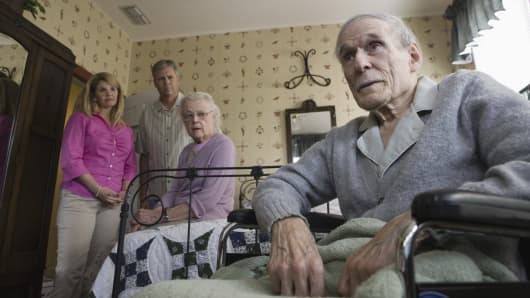Financial advisers are getting a counterintuitive request from clients worried about their long-term care needs: Make me poor.
Called "Medicaid planning," the goal is for the client to give away their money to their kids in order to qualify for government assistance. It is not a new strategy, but with the cost of healthcare rising, retirement benefits shrinking and people living longer, it is increasingly on the table.
A survey released Thursday by the insurer Nationwide Financial found that half of 500 financial advisers polled in July had a client considering this strategy. Most said these clients view it as a way of preserving their children's inheritance.
The first move an adviser should make if a client brings up this plan? Talk them out of it, long-term care experts said.
"Medicaid comes up short in protecting your freedom of choice," said John Carter, president of distribution and sales for Nationwide.
These clients probably do not realize how complicated this plan can be to execute and how limited their care options would be on Medicaid, the federal and state health insurance program for low-income Americans.
The only clients who should be aiming for Medicaid are the ones who truly expect to need it. Everyone else should be reallocating their assets, buying long-term care insurance and holding strategy meetings with their families, experts said.
NAIVETY
Bryan Langdon, who heads up the long-term care insurance division at Fort Wayne, Indiana-based Ash Brokerage, frequently hears about people aiming for Medicaid.
They probably do not know what they are in for, he said, describing how his 50-year-old brother, Tom, was forced on Medicaid after a cancerous brain tumor caused him to lose his job and private insurance. Tom is spending what is expected to be his last holiday season in an overcrowded and understaffed Medicaid facility - the only option close enough for his mother to visit easily.
"Why, at the end of your life, where it's really difficult to maintain control and dignity, would you want to give all that up?" Langdon said.
Many clients aiming for Medicaid propose gifting their savings to their kids via a trust, with the tacit agreement that the kids will support them with the money.
But the government is on the look-out for this behavior, and checks to find out if new applicants transferred assets in the last five years. If they find evidence of someone intentionally impoverishing themselves, the application is delayed. The delay is based on the amount of assets the applicant transferred, said Jeffrey Abrandt, an elder-care lawyer with New York-based Goldfarb Abrandt Salzman& Kutzi.
If a client says they will find away to work around that look-back period, say by planning farther out than five years, ask them if can they count on their kids being responsible with that money. What if the children land in financial trouble?
When clients still feel this is their best option, advisers should not take on this planning themselves. Connect them to an elder-care attorney familiar with the state's Medicaid rules.
OTHER OPTIONS
If you convince a client not to aim for Medicaid, the next step is to reassess how much they can afford for health care.
The average cost per year for a shared room in a nursing home is projected to be $265,000 by 2030. Medicare and private insurance plans cover little, if any, of these costs. And about 70 percent of people over age 65 will require some type of long-term care service in their lifetime, according to a government estimate.
A popular but expensive choice to cover costs is long-term care insurance. Policies can cost roughly a couple thousand dollars a year and are expected to become pricier. But they could be a lifeline when illness strikes, paying around $150 a day for three to five years' worth of long-term care services either in the home or at a facility.
For clients who balk at the price, frame it as an estate-preservation expense, said Karen Lee, founder of the Atlanta-based wealth management firm Karen Lee and Associates. She is 50 and for the past seven years has been paying $3,400 annually for a long-term care policy covering herself and her husband.
"I don't like paying the bill, but it's a necessary evil," she said. "I hope every insurance dollar I paid goes to waste."
Some clients may have health issues that disqualify them from long-term care insurance. If that is the case,see if they would feel comfortable with you calling a family meeting and discussing with relatives what they can do to help with long-term care. Now is a good time of year, with the holidays bringing families together.
These steps should provide clients with more security than a plan to end up on the government dole.


